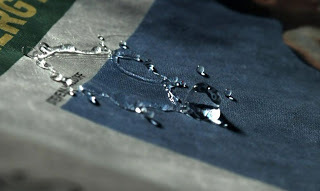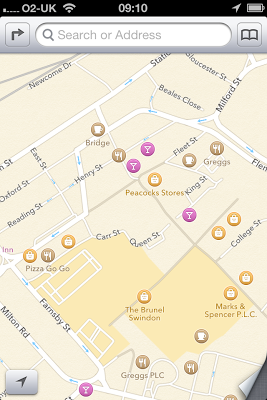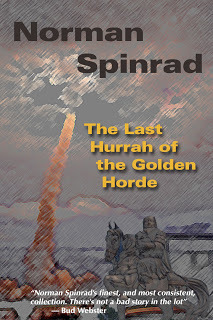Brian Clegg's Blog, page 130
November 19, 2012
Butterflies and toilets
What do a South American butterfly and motorhead TV presenter Richard Hammond have in common? Both have a need to avoid close contact with water. In his 2012 BBC programme Richard Hammond’s Miracles of Nature, Hammond demonstrates an all too common problem: dropping a phone down the toilet.
Apparently 19 per cent of us admit to having had this accident occur at some point. It’s all too easy, particularly if you have a phone in a breast pocket and bend over – or simply slip while holding your handset in the smallest room. We won’t resort to Hammond’s dodgy statistics: he combines the 40 per cent who admit to taking their phones into the loo in the first place (what do the other 60 per cent do with their phones, leave them by the door?) with that 19 per cent to suggest half of those who take their phones drop them down the pan. However, there is no doubt that the toilet and all the other water hazards we face from puddles to simply using our phones in the rain put those most essential of personal gadgets at risk.
 Rather in the same way that I recently took a look at the lotus leaf effect in my series
Nature’s Nanotech
, Hammond was inspired by the magnificent electric blue wings of the morpho butterfly. Living in the rainforest, this large-winged butterfly is in constant danger of inundation, bombarded by large water droplets in a way that could cause its fragile wings permanent damage.
Rather in the same way that I recently took a look at the lotus leaf effect in my series
Nature’s Nanotech
, Hammond was inspired by the magnificent electric blue wings of the morpho butterfly. Living in the rainforest, this large-winged butterfly is in constant danger of inundation, bombarded by large water droplets in a way that could cause its fragile wings permanent damage.To avoid every truly coming into contact with water, the butterfly’s wing surfaces are covered in a series of sharp-edged ridges, making a repeated waffle-like pattern. When a drop of water hits the wing, only a tiny part of the droplet – less than one per cent of the surface – ever comes into contact with the wing. There is no wetting effect – the droplet just rolls off, leaving the wing undamaged. And this is exactly what Hammond wants to see happen to his phone.
 To see just what’s possible, Hammond takes a trip to the Oxfordshire laboratories of our friends at P2i, where a nanopolymer coating produces a very similar hydrophobic water repulsion effect to the butterfly’s wings. To show just how much this approach could do for us, Hammond’s team knock up a Heath Robinson machine where water repellency ensures that things we normally can’t afford to get wet continue to function in simulated rainfall. We see:
To see just what’s possible, Hammond takes a trip to the Oxfordshire laboratories of our friends at P2i, where a nanopolymer coating produces a very similar hydrophobic water repulsion effect to the butterfly’s wings. To show just how much this approach could do for us, Hammond’s team knock up a Heath Robinson machine where water repellency ensures that things we normally can’t afford to get wet continue to function in simulated rainfall. We see:A newspaper that droplets simply run offAn egg carton that won’t become stickyUtensils and containers that don’t dribble or get dirtyA book you read on the beach or by the pool
With surely conscious echoes of the film The Man the White Suit, Hammond finally dons a coated white suit which takes everything that can be thrown at it: beans, coffee, red wine, mustard, fruit juices and soy sauce.
 In that film, inventor Sidney Stratton, played by a young Alec Guinness, produces a new fabric that will never get dirty or wear out. Interestingly, clothing manufacturers hate the idea and take increasingly desperate measures to try to destroy Guinness’s pristine white suit. It’s rather surprising in some ways (but encouraging) that modern manufacturers of phones and sportswear take a rather different attitude and embrace the concept. There is one huge difference, though. In the end, the treatment causes Guinness’s fabric to break down, coming apart in pieces, where the surface coating used here has no impact on the substances in covers from fibres to electronic components on the inside of a phone.
In that film, inventor Sidney Stratton, played by a young Alec Guinness, produces a new fabric that will never get dirty or wear out. Interestingly, clothing manufacturers hate the idea and take increasingly desperate measures to try to destroy Guinness’s pristine white suit. It’s rather surprising in some ways (but encouraging) that modern manufacturers of phones and sportswear take a rather different attitude and embrace the concept. There is one huge difference, though. In the end, the treatment causes Guinness’s fabric to break down, coming apart in pieces, where the surface coating used here has no impact on the substances in covers from fibres to electronic components on the inside of a phone.This takes us back to the phone down the toilet – with a quick treatment at P2i, Hammond’s phone not only survives the submersion but rings underwater (rather him than me when it comes to holding it to his ear – and Richard, take off the bracelets next time, they will get soggy).
In the classic ‘light entertainment science’ mode that Hammond pioneered with the Sky series Brainiac, the programme rather firmly makes the point. This is something we really want for our phones. They are far too precious to be damaged by water – and the whole point of having a mobile is that you should be able to use it safely wherever you are.
I think Hammond missed an important point he made, which is that this is a concept with even more potential than the essential role of keeping phones safe. I know the coating is also used on trainers and some military clothing, but I would have thought there are a fair number of much broader applications, just as the Heath Robinson machine suggested, that go beyond the current imaginings of the marketers of this technology.
For the moment, though, our phones remain the main target for this technology. We shouldn’t think this is only a problem in the bathroom – there are plenty of other opportunities for water damage to phones that could be averted with well-applied water resistance. It’s time for that butterfly to stretch its wings.
Images - As seen on BBC 1's Miracles of Nature
Published on November 19, 2012 00:24
November 16, 2012
Apple Maps - not so bad, but stupid
 Finding my way around Swindon with Apple Maps
Finding my way around Swindon with Apple MapsWow, you have a Peacocks and two Greggs?! Respect.People like to knock the big guy, and why not? We enjoy giving Starbucks a good kicking for not paying any tax in the UK, for instance. Traditionally Microsoft was always hated by many as the big corporate IT behemoth, but of late Apple has taken over this role. What used to be the cool rebel alternative has become mainstream, large and ... a target.
So it was delight for many when Apple kicked themselves firmly in the iOS with their Maps app. If you haven't come across the many Apple Maps jokes and the reason behind them, here's the thing. Google used to provide the mapping application used on iPhones and iPads. It was a very good mapping application - Google have been in this business a good time. But Apple decided they'd go it alone and do their own app. Which wasn't always perfect. To say the least. So much booing and hissing for Apple and kudos for Google (itself not insignificant in the corporate behemoth stakes).
However, I have to say my own experience of Apple Maps is rather different from the online wailing and gnashing of teeth. I use maps on my phone a lot. If I've got a meeting in London, for example, and emerge from a tube station, 10 second with Maps and I've oriented myself, know which road to walk down and I'm off. It's brilliant. And to be honest I have not found any real difference in this respect in switching from Google to Apple mapping.
For me, the idiocy with the Apple Maps change was not so much the errors - they were/will be fixed soon enough - it's the focus. The new Maps app was much hyped before launch because of its ability to do flyovers of a few cities. If you go to Apple's site describing the new operating system, it's the flyovers that stand out. Frankly, who cares? It's a gimmick, a toy you will play with for 2 minutes. But Maps is a bread and butter app. It delivers really important stuff day to day: finding your way around, specifically on foot. (Yes, it has turn by turn directions for cars, but I prefer my satnav which tells me the names of the streets and doesn't stop working when I lose signal.) To concentrate on the flyovers feature is a bit like Word making a big thing of WordArt. Yes, it's pretty, but it's not what Word is mostly used for. If the developers had concentrated on how people actually use Maps, rather than the gimmicks, they would have done a better job in the first place.
And I think that's a lesson for business as a whole.
Published on November 16, 2012 01:18
November 15, 2012
Turning Japanese (I really think so)
 There's something special and just a little bizarre about receiving translations of books - here is something you are being paid for, that should contain your thoughts, and yet you have not got a clue what is actually in it. Don't get me wrong - I'm sure the translator has done a superb job, I just don't have any idea what this book says. It could be the (very large) instruction manual for some hi-tech equipment for all I know. But what book is it? Could you guess from the cover? I'll come back to this later.
There's something special and just a little bizarre about receiving translations of books - here is something you are being paid for, that should contain your thoughts, and yet you have not got a clue what is actually in it. Don't get me wrong - I'm sure the translator has done a superb job, I just don't have any idea what this book says. It could be the (very large) instruction manual for some hi-tech equipment for all I know. But what book is it? Could you guess from the cover? I'll come back to this later.As you can see from the photo (and the title of the post is a bit of a give away), this is a Japanese translation, and rather a handsome hardback. If you aren't sure if a book is Japanese or Chinese, in my experience the Japanese translations usually come with those distinctive paper strip covers (the yellow bit at the bottom) that only stretch to half or less of the book's size.
When I get translations like this I usually give them away when I do talks if I can find anyone in the audience who speaks the appropriate language, but as I've several to spare, I would be happy to provide one to any readers of this blog who would like them - I just ask that you pay the post & packing, which I reckon will be £4 in the UK, £5 for the EU - I'm asked not to send them outside the EU. If you would like a copy, just drop me an email at brian@brianclegg.net with your address and I'll let you know how to pay for the postage.
Oh, and what was the book? It's Gravity .
Published on November 15, 2012 00:49
November 14, 2012
Where does money come from?
 Listening to one of the RSA's excellent 15 minute 'Four Thought' talks on Radio 4 the other day I was struck how naive I was about how money was created. And I think I'm not alone. When I say how money is created, I don't mean companies earning it, I mean extra money added to the supply. My naive reaction would have been 'The Bank of England does it - quantitative easing, that sort of thing.' But actually the BoE is a small player in this.
Listening to one of the RSA's excellent 15 minute 'Four Thought' talks on Radio 4 the other day I was struck how naive I was about how money was created. And I think I'm not alone. When I say how money is created, I don't mean companies earning it, I mean extra money added to the supply. My naive reaction would have been 'The Bank of England does it - quantitative easing, that sort of thing.' But actually the BoE is a small player in this.The reason I missed the point is that I hadn't really thought about what ordinary high street banks do with money. Don't get me wrong. I wasn't like a young friend of ours many years ago who thought that the bank had a series of shoe boxes (or equivalent), and when she paid money in, they put it in her shoe box in the safe. I knew the money you pay in just enters the system and can go anywhere. But I hadn't thought about another aspect of dealing with banks.
Let's imagine you go to your bank and get a loan. You can do it online in about 2 minutes - it's frighteningly easy. At the end of the process, the bank waves that magic wand and the amount you borrow - £1,000, say - is in your account. Nothing has actually moved anywhere. All they have done is increased the number on the computer file that says 'Brian's balance' (my electronic shoe box). And here's the totally amazing thing. They just created that money. They didn't need anything to back up that number. They just changed the value and hey presto there was more money in the system. Simples.
And scary. That is, on the whole, how money is made without any need for any reserves to back it up. Which it's hard not to see as a contributory factor in the financial mess we got into. You can hear the original talk here and I recommend it.
Published on November 14, 2012 01:20
November 13, 2012
Old new worlds
 When I was purchasing Henry Gee's Sigil trilogy from Reanimus Press (review of Henry's masterpiece to follow - I haven't had a chance to read it yet), I noticed they had reprints of some classic science fiction. I'm a sucker for this - my SF enthusiasm peaked in the 60s and 70s, so anyone who has emerged since isn't really on my radar (seriously - I consider Ben Bova trendy). Something that caught my eye was a book of short stories by Norman Spinrad. To be honest he's not an author I had had much to do with, but it was reasonably priced, and short stories are idea for ebook reading, so I downloaded a copy of The Last Hurrah of the Golden Horde - and I am so glad I did.
When I was purchasing Henry Gee's Sigil trilogy from Reanimus Press (review of Henry's masterpiece to follow - I haven't had a chance to read it yet), I noticed they had reprints of some classic science fiction. I'm a sucker for this - my SF enthusiasm peaked in the 60s and 70s, so anyone who has emerged since isn't really on my radar (seriously - I consider Ben Bova trendy). Something that caught my eye was a book of short stories by Norman Spinrad. To be honest he's not an author I had had much to do with, but it was reasonably priced, and short stories are idea for ebook reading, so I downloaded a copy of The Last Hurrah of the Golden Horde - and I am so glad I did.Although these stories are probably 50 years old, they are mostly timeless. Okay, one or two have a slightly dated feel to the female characters, and there are a couple where the technology caught him out, but story after story was brilliant - really exploring the implications of different types of life and world for very ordinary human beings. I particularly liked the way he thought through the commercial implications of interstellar flight.
With the exception of the last two pieces (including the title story), which seem to have been strongly influenced by the SF 'new wave' urge to write something that doesn't make a lot of sense, these are some of the best SF stories I have read in a long time. They work so well on the iPad too. Highly recommended if you like this kind of thing.
You can download the book direct from the publisher, or get it on Kindle from Amazon.co.uk or Amazon.com.
Published on November 13, 2012 01:21
November 12, 2012
Should you go back? OR revisited
 Long ago, in an airport far, far awayMy first job was in Operational Research. If this doesn't mean much to you, it was a discipline that originated in the Second World War to provide mathematical problem solving for challenges like what was the best pattern to drop depth charges to be most likely to hit a submarine. After the war it became popular in nationalised industries and when I joined the soon-to-be-privatised British Airways in 1977 it was going strong there.
Long ago, in an airport far, far awayMy first job was in Operational Research. If this doesn't mean much to you, it was a discipline that originated in the Second World War to provide mathematical problem solving for challenges like what was the best pattern to drop depth charges to be most likely to hit a submarine. After the war it became popular in nationalised industries and when I joined the soon-to-be-privatised British Airways in 1977 it was going strong there.Last Friday was a 60th anniversary reunion of people who had worked in OR at British Airways over the years. I must admit I had mixed feelings about going. My general principle is 'never go back.' I really can't understand people from Oxbridge, for instance, who return to their college to make use of their 'dining rights'. Why go all that way to have a so-so meal in uncomfortably formal surroundings with a bunch of academics you don't know? But this was rather different - a chance to see a whole bunch of people many of whom I haven't come across for 20 years or more, and I'm glad I went.
When I first worked at BA I was trained in an office in a building called Comet House (now demolished), and of the circa 8 other people working there 6 were present, which was wonderful. Of maybe 150 people present, I knew at least half, and it was a constant, pleasant stream of 'Oh, what are you doing now?'s and even the occasional 'I've read one of your books!' or 'How do you keep putting so much rubbish in your blog?' (or words to that effect).
There was one of those inevitable Powerpoint shows with a panoply of events of the years - I was honoured to get a mention, though with the bizarre twist of memory, I had totally forgotten the event I was mentioned for. I had championed a new PC software environment, something called 'Microsoft Windows' in the company. According to the slide, the IT department decided it would never catch on...
There is still a thriving Operational Research department at BA - what I don't understand is why OR isn't more common in large companies. The ability to do flexible decision making and problem solving using mathematical and hi-tech solutions is surely of demand everywhere, but OR still seems to be largely limited in the UK to a very small range of industries. (If you want to find out a bit more about OR, take a look at the OR Society's 'learn about OR' website.)
All in all, though, an excellent evening - and a good example of when 'never go back' does not apply.
Published on November 12, 2012 01:28
November 9, 2012
Kindling in the UK
 Yes, I'm on Amazon.comThere's a lot about ebooks that is still a mystery - never more so than when we're dealing with Amazon's Kindle. As an Amazon Prime customer I was interested to see they've added the ability to 'borrow' Kindle books... but was then rapidly let down to find out that you can only do so on Kindle devices, not my trust iPad or my desktop computer. (Not really the topic here, but I am also still very peeved that US Prime customers get free movie streaming and we don't in the UK.)
Yes, I'm on Amazon.comThere's a lot about ebooks that is still a mystery - never more so than when we're dealing with Amazon's Kindle. As an Amazon Prime customer I was interested to see they've added the ability to 'borrow' Kindle books... but was then rapidly let down to find out that you can only do so on Kindle devices, not my trust iPad or my desktop computer. (Not really the topic here, but I am also still very peeved that US Prime customers get free movie streaming and we don't in the UK.)But the thing that made me write this post was the complications of books and territories. When, as an author, you sell a book to a publisher you sell various rights. You might, for instance, sell world rights, or English language rights, or just UK and Commonwealth rights. And the publisher can then sell the book in those territories. But the internet potentially makes a nonsense of this. I have long been able to buy a book from Amazon.com that only has US rights to be shipped to the UK. However, once you get ebooks in the mix, things get even more complicated.
Take my books with the US publisher St Martin's Press. They have world rights, so no issues here. But for a long time the Kindle versions were only available in the US. Why? No one knows. You couldn't even see them on Amazon.com from the UK. After I moaned about this, they have now made some available on Amazon.co.uk (huzzah!)... but there's still an oddity.
My last two books with St Martin's were published in the UK by the British publisher Duckworth. Rather than export their own copies, St Martin's sold Duckworth the UK rights, just as they would to a German publisher, say, for a translation. The question then is, whose ebook gets published? Because Amazon only does one Kindle edition. Well, surely the St Martin's Press version, as they have world rights? Nope. Bizarrely, even if you buy the ebook of Build Your Own Time Machine from Amazon.com it's Duckworth's edition. The are even using the UK title - the US paper book is called How to Build a Time Machine. Puzzled? I certainly am.
If you are either of my UK fans and have been waiting patiently for Kindle editions, you can now get the following on Kindle:
The God EffectBefore the Big BangArmageddon ScienceBuild Your Own Time Machineand you have always been able to get:Inflight ScienceThe Universe Inside YouLight YearsUpgrade Me
Published on November 09, 2012 01:13
November 8, 2012
The science they didn't teach at school

I have recently added a new website to the family - sciextra.com. The idea is to provide bite sized bits of the most interesting bits of science, the science they didn't teach at school. The stuff that makes you go 'Wow!'
It's early days on content, but the idea is to have short videos and articles/blog posts on the bits that make science so interesting.
Please do take a look and give me any feedback. Realizing I can't exactly do super-slick videos I decided to go for a very informal (ok, amateurish) approach - I am hoping this will come across as endearing, rather than than incompetent.
To give a taster, if you can't be bothered to click through (but please do!) here's the first video produced for the site, explaining why, given time travel is possible, we haven't be inundated with time travellers from the future:
Published on November 08, 2012 00:30
November 4, 2012
Graphic novels get heavy - Anomaly review
 Anomaly in its rather smart cardboard caseWhen I was a kid, you read comics until you were around 11, then you moved on to real books. I know things have been rather different in the US, where comics always had an older audience - and of course the term 'comic' has to be quite broad when it takes in both The Beano and Batman - but the thing that really changed attitudes of (at least some) readers in the UK was the graphic novel. This was the comic form taken to novel length and treated as serious material for grown ups.
Anomaly in its rather smart cardboard caseWhen I was a kid, you read comics until you were around 11, then you moved on to real books. I know things have been rather different in the US, where comics always had an older audience - and of course the term 'comic' has to be quite broad when it takes in both The Beano and Batman - but the thing that really changed attitudes of (at least some) readers in the UK was the graphic novel. This was the comic form taken to novel length and treated as serious material for grown ups.Personally I have never quite got into graphic novels. In part it is a slight embarrassment - I wouldn't read one in public because it gives the impression, like it or not, that you struggle with reading. The other problem I have is that I'm more a word person than a visual person - so when I do read one I have to force myself to slow down and look at the pictures, or I just hurtle through the relatively limited text. However, I'm always interested in a new reading challenge, so when the publisher offered to send me a copy of the indubitably remarkable graphic novel Anomaly I jumped at the chance.
What we have here is an epic story in graphic novel form. It's huge, literally a heavy piece of work and has an impressive dramatic span. Set in the 28th century we have a fairly conventional post industrial wreck of an Earth, run by a corporate conspiracy theorist's delight called the Conglomerate. Traditionally their attitude to other planets is to conquer them, wiping out life if necessary. Some ethical types propose instead taking a more friendly approach. They are sent to a planet, not realizing that this is actually a plan to get rid of them and take over their shares in the Conglomerate, as no one has ever returned alive from this planet.
On their arrival all their technology is destroyed. They find a wide range of humanoid life forms, mostly as separate tribes, but with a major organized force of bad guys. There's the usual swordplay with a touch of magic stuff, a uniting of the various tribes to take on the baddies - you know the kind of thing.
 Open in all its glory - drink can for scale
Open in all its glory - drink can for scaleIn one sense this is a very impressive work. You've got hundreds of pages of well-drawn artwork. It is like working your way through a very detailed storyboard of a visually impressive movie. There are one or two nice twists, like the technology destroying goo, but if I'm honest the story isn't very original. The uniting of the tribes to take on the baddies is hugely reminiscent of the defence of Minas Tirith segment of The Lord of the Rings (the baddies even resemble the orcs in the movie version of LoTR).
 Tell me that doesn't remind you of Lord of the RingsFor the rest, there's a lot that seems derivative of Rider Haggard Martian adventures with a modern gloss. It's entertaining, I did want to read on and finish it, but I'm not sure the originality of the storyline lives up to the presentation. There are some interesting loose ends, both in terms of what happens to the Conglomerate when our heroes return and why the names, as someone in the novel points out, are all Celtic or Greek. But it's a shame the story wasn't as original as the presentation.
Tell me that doesn't remind you of Lord of the RingsFor the rest, there's a lot that seems derivative of Rider Haggard Martian adventures with a modern gloss. It's entertaining, I did want to read on and finish it, but I'm not sure the originality of the storyline lives up to the presentation. There are some interesting loose ends, both in terms of what happens to the Conglomerate when our heroes return and why the names, as someone in the novel points out, are all Celtic or Greek. But it's a shame the story wasn't as original as the presentation.It's also worth mentioning the app-based extension. With a free app for tablets and smartphones, some pages open up with extra detail, including 3D images and extra information. This augmented reality stuff is fun, but it's a bit like the extras on a DVD. Many people will ignore it altogether, and it really doesn't make a huge difference to the product.
I have two other problems with Anomaly. One is the sheer weight of the thing. You can get an idea of this in that it cost £9 for the publisher to post it to me. I usually get a feel for the weight of heavy books by putting them on the kitchen scales, but Anomaly left them reeling, and they give up at 2.3 kilograms. To illustrate why this is a bad thing, I need to take you back to my university days.
I used to sing in a Cambridge college chapel choir, and at one choir practice the junior organ scholar turned up and told us that the senior organ scholar would not be joining us. Apparently he had sprained his wrist in bed, so couldn't play. It was at least five minutes before the choir could be pulled together sufficiently to continue. (This did happen.) You really don't want to read this book in bed, in case of suffering a similar fate. And I found it was getting uncomfortable holding it to read wherever I sat with it, resulting in various mechanisms being adopted to prop it up.
 Funky! Let's warp...The other issue is the price. This is a very big book, with over 300 glossy full colour pages. That's not cheap to make and it is reflected in a massive cover price of £45 ($75). Okay, you can probably get a 40 to 50 per cent discount if you buy it in the right place, but it's not cheap. I compared the experience of reading the book to that of watching a movie, and I'd be happy to pay as much as I would for a DVD, but that feels about the limit for me. The augmented reality app is a bit of fun, but more gimmick than anything.
Funky! Let's warp...The other issue is the price. This is a very big book, with over 300 glossy full colour pages. That's not cheap to make and it is reflected in a massive cover price of £45 ($75). Okay, you can probably get a 40 to 50 per cent discount if you buy it in the right place, but it's not cheap. I compared the experience of reading the book to that of watching a movie, and I'd be happy to pay as much as I would for a DVD, but that feels about the limit for me. The augmented reality app is a bit of fun, but more gimmick than anything.I can't help feel the pricing will limit the audience. But if this is your kind of thing it's likely to be well worth the pennies. Take a look at Amazon.co.uk and Amazon.com
Published on November 04, 2012 23:00
November 2, 2012
Equality works both ways
I don't know if it's because of the Jimmy Savile case, but I've heard several pieces on the radio recently about sexual harassment at work. (I know what Savile is alleged to have done is far worse than harassment, but it seems to have triggered the discussion.) I think it's important we recognize that sexual harassment exists and needs dealing with, and also that it exists in both directions.
I had to deal with three cases that could be classed as sexual harassment when I was a manager. One was by a male - a very simple one. This was in the early days of being able to display a photo on a Windows background and an employee had chosen a picture of a topless woman. It was inappropriate, caused offence and he was asked to remove it. The other two incidents were by females. One was a classic case - standing too close, inappropriate touching and suggestions - and was dealt with firmly. The other was more subtle. The offender was either very knowing or naive. Early on I had to suggest to her that a body stocking with a jacket over the top was not appropriate workwear. And later I had to point out that it wasn't ideal for her to speak to a male colleague while sitting on her desk, wearing a skirt, with her legs wide open pointing in his direction.
The reason I bring this up is that I think we do tend to treat harassment of men by women differently from the other way round. We are rightly shocked and offended when a man harasses a woman, but if a woman harasses a man it tends to be laughed off. 'What kind of a man is he?' I heard commented when someone once complained.
An extreme example of this asymmetry came up in an interview with a film star that was on the TV the other day. It turned out said (male) star lost his virginity age 15 to a woman in her forties. The response of the audience and the interviewer was not shock (for the victim) and disgust (for the predator) but rather big smiles, nudge-nudge, wink-wink - who's a lucky boy, then? Yet this is an exact parallel of the sort of thing Savile is being accused of (if on a smaller scale).
I don't think we will take any kind of sexual harassment and predation seriously enough - from the small scale comments to assault - until there is no sexual discrimination in the way such behaviour is treated. Perhaps this attitude has changed now. It's a while since I worked in an office. But I suspect it hasn't.
I had to deal with three cases that could be classed as sexual harassment when I was a manager. One was by a male - a very simple one. This was in the early days of being able to display a photo on a Windows background and an employee had chosen a picture of a topless woman. It was inappropriate, caused offence and he was asked to remove it. The other two incidents were by females. One was a classic case - standing too close, inappropriate touching and suggestions - and was dealt with firmly. The other was more subtle. The offender was either very knowing or naive. Early on I had to suggest to her that a body stocking with a jacket over the top was not appropriate workwear. And later I had to point out that it wasn't ideal for her to speak to a male colleague while sitting on her desk, wearing a skirt, with her legs wide open pointing in his direction.
The reason I bring this up is that I think we do tend to treat harassment of men by women differently from the other way round. We are rightly shocked and offended when a man harasses a woman, but if a woman harasses a man it tends to be laughed off. 'What kind of a man is he?' I heard commented when someone once complained.
An extreme example of this asymmetry came up in an interview with a film star that was on the TV the other day. It turned out said (male) star lost his virginity age 15 to a woman in her forties. The response of the audience and the interviewer was not shock (for the victim) and disgust (for the predator) but rather big smiles, nudge-nudge, wink-wink - who's a lucky boy, then? Yet this is an exact parallel of the sort of thing Savile is being accused of (if on a smaller scale).
I don't think we will take any kind of sexual harassment and predation seriously enough - from the small scale comments to assault - until there is no sexual discrimination in the way such behaviour is treated. Perhaps this attitude has changed now. It's a while since I worked in an office. But I suspect it hasn't.
Published on November 02, 2012 00:43



